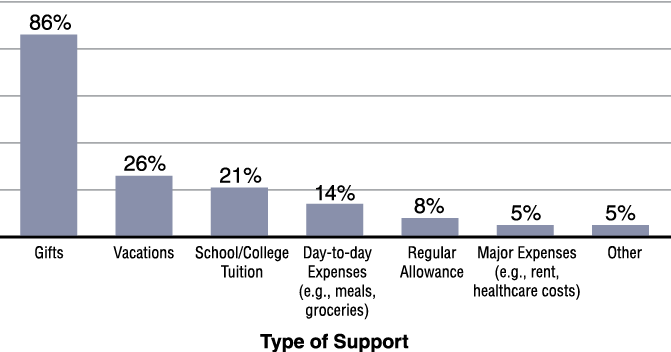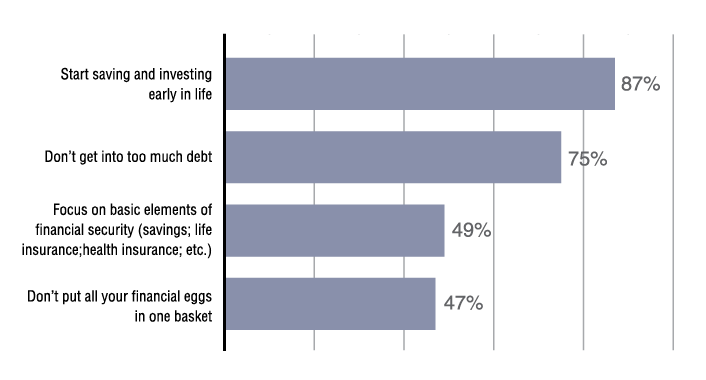The Art of Grandparenting No. 9: Grandparenting and Financial Assistance to Grandchildren
(FS1983, Sept. 2020)Grandparents often extend financial help to grandchildren. Grandparents can assist a grandchild with financial needs, make investments in a grandchild's future, and teach money management lessons. This bulletin highlights key ideas and resources in extending financial assistance to grandchildren.
Sean Brotherson, Ph.D. Family Science Specialist, NDSU Extension; Meghan Yerhot, M.S. Extension Associate, NDSU Extension; Franchesca Cortez, M.S.
Contact your county NDSU Extension office to request a printed copy.
NDSU staff can order copies online (login required).

Grandparents are known for their generosity during holidays, birthdays, vacations or times of need. Many grandparents today are helping financially more than in the past.
Not only has the assistance from grandparents increased, the average age of grandparents today is significantly lower than in the past. This publication explores issues related to grandparents providing financial assistance to grandchildren, financial decisions and some helpful resources in this process.
What are Grandparents Paying For?
So, how much is “too much” when giving to grandchildren? How do you balance your opportunities to help out financially with your own financial needs? How do you want grandchildren to benefit? These are important questions to consider when helping grandchildren financially.
Supporting grandchildren with financial assistance is not uncommon among grandparents. In fact, research shows that nearly 94% of grandparents provide some monetary help each year, spending an average of $2,562 annually on their grandchildren.
Where does this money go? By far, the largest percentage (86%) of grandparents contribute by buying gifts for their grandchildren, which averages to $805 in spending each year. A 2018 American Association of Retired Persons (AARP) study on grandparents and money shows what percentage of grandparents contribute in different ways financially to support grandchildren.
Grandparents give financial support quite often to their grandchildren and do it in a variety of ways. Some grandparents have the financial resources to give substantially while others may have very limited income.
However, if giving, you should do it in a way that fits your circumstances, financial needs and values. For some grandparents, this may mean tucking some money into a birthday card each year. For others, it may mean helping purchase a grandchild’s first instrument for the child’s involvement in school band or orchestra.
Another survey by the Metlife Mature Market Institute found that nearly two-thirds (62%) of grandparents provided grandchildren with financial support for a variety of reasons. These efforts ranged from small purchases to large expenses, including basic needs or support (40%), education costs (29%), life events such
as a wedding (21%), savings (15%) or medical bills (8%).
Many grandparents focus on “purposeful giving,” which is intended to support education, training or common forms of financial protection (life insurance, etc.). Support for education occurs in a variety of ways, such as giving support for a grandchild’s college tuition or loans, contributing to an education savings plan, paying costs from pre-school through high school, or providing money for tutoring, educational supplies or enrichment programs. When you have limited financial resources, consider that even a small birthday gift or a dollar for an ice cream cone is meaningful to a grandchild.
“My grandkids have the biggest cheerleader in me. I have helped my grandson buy a car (he is still making payments to me) and help with tuition if needed. As long as he continues on the path he is on, I will help him in any way I can.” (Grandparent giving financial support)
What Are Grandparents Often Paying For?
- Birthday or holiday gifts
- Day-to-day expenses
- Vacation costs
- Life events (wedding, etc.)
- Mortgage or rent
- Health care
- Child care
- Education costs
- Other needs


My Financial Spending and Grandchildren
A “spending plan” is a wise way to approach financial giving regardless of your income level.
Briefly assess your past financial contributions to grandchildren by placing a check mark next to items you have spent money on in the past year. Then consider writing in amounts you might want to give during the next year or next five years.
Spending Plan for My Grandchildren
|
Category |
√ (if $ given in past year) |
Planned Amount Next Year |
Planned Amount During 5 Years |
|---|---|---|---|
|
Clothing |
|||
|
General support (food, basic needs) |
|||
|
Gift (birthday, etc.) |
|||
|
Vacation |
|||
|
Education |
|||
|
Life event (marriage, etc.) |
|||
|
Savings account/fund |
|||
|
Allowance |
|||
|
Car purchase or lease |
|||
|
Pay off debt |
|||
|
Purchase an investment |
|||
|
Rent |
|||
|
Medical bills |
|||
|
Down payment on home |
|||
|
Life insurance |
|||
|
Other |
Things to Consider When Giving the Gift of Money
Giving money for special occasions or bigger purchases is generous and not uncommon. As you find yourself grandparenting one or more grandchildren, ask yourself what you want them to get out of your generosity. Is it just the kindness of the gift? Do you want them to learn financial skills? Do you want to teach them the importance of saving in tight financial times?
Beyond celebrating a birthday or helping with an immediate need, grandparents give for a variety of reasons. These reasons include:
- A person’s values may include the idea that “passing it on” includes giving financially to the generations that follow and helping them be economically successful.
- A grandparent still may be working and have sufficient financial resources and a desire to share with others.
- A grandparent may feel that financial security and learning to handle money are important keys to a grandchild’s future well-being.
- Some grandparents are willing to sacrifice in their own financial situation to help adult children or grandchildren gain skills or education for a more productive future.
- Grandparents may wish to give generously while grandchildren still are growing and they have the means to contribute rather than waiting until later to pass on financial resources.
As a grandparent, consider your own values and also your motivation when making decisions about giving money to grandchildren.
You have important considerations in giving money that you need to consider. However, whether you decide to give money (or not give money) to your grandchildren and how you do so is up to you. You may wish to focus on teaching them how to save for a rainy day. Here are a few things to remember when giving a gift of money to a grandchild:
Tax penalties and tax breaks
- Will the amount given provide a tax break for you? Will the amount given affect the amount of taxes that you or the recipient must pay? Consult a financial professional for more information.
Family conflict
- Do you need to consider fairness in giving a financial gift? Think about how family members may react to your giving efforts. Seek to minimize potential conflicts.
Your current and future financial resources
- Will your current and future financial situation be impacted by your giving? You may need to make some other decisions prior to giving financial gifts.
Your own retirement
- Is your own retirement security going to be affected? Can you afford to give?
Interest to acquire through time or to be spent how they choose
- Do you want to give early and allow money to accrue interest through time? Or do you want to place guidelines on how money can be spent? Think about your values and any guidelines you want to pass on with a monetary gift.
Involve adult children and grandchildren
- Are adult children aware of the gift to a grandchild? What role do you foresee adult children playing in the process? Trust, confidentiality and relationship quality also may influence the involvement of adult children in a financial contribution to a grandchild.
Communication about the financial gift
(for example, to use for school purposes only; to pay for a new bike only)
“[Helping with the grandchild’s loan] means a lot more than I can tell you actually. I feel like – especially when it comes to their education – doing it now is more important than waiting for me to die to do it for them. I feel it is very important to not have all the student debt and have that as a worry when they are entering the workforce.” (Grandmother of three providing financial help)
Investments for Your Grandchildren
Instead of giving cold, hard cash, you might instead consider the possibility of investment gift options for grandchildren. This type of option may not fit your financial situation or wishes. However, for others, it is a valued strategy for assisting a grandchild financially.
Here is a quick overview of different types of investment options. For more information about these investment options, you should speak with a knowledgeable financial adviser.
1) Roth Individual Retirement Account (IRA) – This tax-free withdrawal account provides more wiggle room for how your grandchildren use the funds. This option can be a great way to start your grandchildren on a path to financial well-being.
2) Coverdell Education Savings Account – This option is a specific type of savings account to cover educational expenses. This account is tax-free as long as it is not more than the total education expenses.
3) 529 Plan – Two types of 529 savings plan exist: pre-paid tuition plans and college savings plans. An important thing to note about these plans is that they potentially can affect the amount of financial aid the student receives. The amount of need may be different based on the 529 plan, so be aware of what type of costs and the financial situation of all involved in educational expenses. Tax penalties and tax benefits are components of the 529 plan. Penalties arise when withdrawals are made and spent on noneducational expenses.
4) Trusts – If you want to invest $25,000 or more, trusts are a great option for greater amounts of funding.
5) UGMA or UTMA Custodial Accounts – This option refers to what are known as Uniform Gifts to Minors Act (UGMA) or Uniform Transfers to Minors Act (UTMA) accounts, which are types of custodial accounts that allow adults to transfer assets to a minor. Such accounts are great for smaller gifts and can be used for any purpose, not just educational expenses, for example.
6) Stocks or Bonds – Such investment options may be subject to the gift tax unless the amount is under $14,000 or jointly with your partner $28,000.
These different options provide a range of possibilities for supporting grandchildren with financial contributions. Whatever your financial situation, considering the resources you will leave behind when you eventually pass on also is wise.
To assist your family in managing any remaining assets, financial and nonfinancial (property such as mementoes, etc.), you should take steps to provide guidance in the form of a will or other legal mechanism (financial trust, etc.). To determine what might fit your interests and circumstances, you should work with a qualified financial professional.
To Give Without Tax Penalties
- Write a check. By writing a check, you can give up to $14,000 per grandchild without a tax penalty. If you are married, you and your spouse can jointly give up to $28,000.
- If you are helping pay for medical expenses, pay directly to the insurance company, health-care provider or hospital. This way you avoid tax penalties and are still able to help.
- Helping with tuition? To avoid penalties, make the payments directly to the school.
- Custodial accounts allow you to control how the funds are spent until the age of 21. This helps protect you from tax penalties if, for example, the funds were spent on something other than educational expenses.
Learning Financial Literacy Together – A Goal Setting Exercise
Giving money to your grandchildren can be a fun and interactive learning experience. Instead of just passing on money, setting a good financial example and teaching healthy financial practices are important elements of extending financial help to grandchildren. You can teach financial lessons to a grandchild whether you have a limited, moderate or high-income level.
To get started, set some financial goals for yourself and your grandchildren. As an example, for some families who like to take family trips, this could be a great time to involve the grandchildren in all the costs and planning. Another way you might involve your grandchildren could be through helping them plan for and assisting with a bigger purchase, such as a bike or even a car.
Working together with your grandchildren provides an opportunity to teach them the process of setting and reaching for financial goals. In turn, this can set them up for a better understanding of their own finances.

Upcoming Financial Goals
A discussion of financial goals with grandchildren might include asking what kind of bike they want, discussing career or college plans or simply exploring how much money to save during the next three months. Look at the options below and discuss them with a grandchild. Select some simple and reachable financial goals that you can work toward with each other.
1. Short-term (goals that can be met in less than three months)
__________________________________________________________
__________________________________________________________
__________________________________________________________
2. Intermediate (goals that can be met in three months to one year)
__________________________________________________________
__________________________________________________________
__________________________________________________________
3. Long-term (goals that take longer than one year to reach)
__________________________________________________________
__________________________________________________________
__________________________________________________________
Getting the Grandkids Involved with Finances
- Matching funds to purchase an item or save for a purchase can get them motivated and excited! Put up $5, $10, $50 or $100 to match that amount when they are ready.
- Give to a charity the family supports or a grandchild wants to support. Study it together.
- Establish a savings account at a local financial institution with a grandchild and make a contribution to it.
- Turn a financial gift into a lesson by going to the store with them to purchase what they want. Talk about the costs and give them opportunities to put some of the gift into their savings.
- Teach your grandkids to use the “three envelopes rule” for cash gifts: one for saving, one for sharing with others and one for spending. Also, teach them to figure out if a future purchase is a want or a need.
- Use the time spent together to assess financial goals and make some plans to pursue financial well-being.
Brainstorm some finance experiences where you could involve your grandchild(ren). Be creative! Write down two or three.
- __________________________________________________________
- __________________________________________________________
- __________________________________________________________

Your Money, Your Grandchildren
Being a grandparent gives you many opportunities to be generous in your gift giving. It also gives you the ability to teach your grandchildren financial skills, which will prepare them for the future. Grandparents want a positive future for their grandchildren and assisting with finances can be one pathway to brighten that future.
Being aware of your own financial situation in regard to retirement, savings and investments will allow you to be smart about the money you are passing on to others. Set goals that fit with your specific needs, interests and circumstances. Take your finances seriously and help your grandchildren learn how to value money and learn skills to manage it well for a better future.

Recommended Resources
Books
Godfrey, J. (2013). Raising financially fit kids. New York: Ten Speed Press.
Palisades Hudson Financial Group. (2019). Looking ahead: Life, family, wealth and business after 55. Kindle Direct Publishing.
Organizations and Websites
American Association of Retired Persons (AARP), Relationships resource page – The Relationships resource page on the AARP website offers ideas, articles and discussion groups for a variety of grandparenting issues.
Website: www.aarp.org/relationships/
FinAid – Established in 1994 as a public service, FinAid is an award-winning site that provides comprehensive information on student financial aid, advice and decision-making tools. Website:
https://finaid.org/
Generations United – This organization focuses on improving the lives of children, youth and older people through resources, programs and intergenerational collaboration. Website: www.gu.org/
Grandkids Matter – Supported by the National Association for Grandparenting, Grandkids Matter is an online resource center offering tips, videos, articles and other resources on grandparenting topics. Website: https://grandkidsmatter.org/
References
AARP Research. (2019). Money and the modern grandparent. Washington, D.C.: AARP Research. Online at: www.aarp.org/content/dam/aarp/research/surveys_statistics/life-leisure/2019/aarp-grandparenting-study-money-fact-sheet.doi.10.26419-2Fres.00289.017.pdf
Beach, B. (2013). Grandparental generosity: Financial transfers from grandparents to grandchildren. London: ILC-UK. Online at: https://ilcuk.org.uk/wp-content/uploads/2018/11/Grandparental-Generosity.pdf
Harrington Meyer, M., and Abdul-Malak, Y. (Eds.). (2016). Grandparenting in the United States. New York: Baywood Publishing Co.
Heath, S., and Calvert, E. (2013). Gifts, loans and intergenerational support to young adults. Sociology, 47(6), 1120-1135.
Metlife Mature Market Institute. (2012). Grandparents Investing in Grandchildren: The MetLife Study on How Grandparents Share Their Time, Values, and Money. New York: MetLife Mature Market Institute and Generations United. Online at: www.gu.org/app/uploads/2018/05/Intergenerational-Report-MMMI-Grandparents-Investing-In-Grandchildren-Study.pdf
Palisades Hudson Financial Group. (2019). Looking ahead: Life, family, wealth and business after 55. Kindle Direct Publishing.
Scharmer, L. (May 2013). Taking charge of family finances. Extension publication FE222. Fargo, N.D.: NDSU Extension.
TIAA Individual Advisory Services. (2019). Saving for college and financial aid options. New York: Teachers Insurance and Annuity Association of America-College Retirement Equities Fund. Online at: www.tiaa.org/public/pdf/college_savings_and_finanical_aid_options.pdf
U.S. Securities and Exchange Commission. (2018). Investor Bulletin: 10 Questions to Consider Before Opening a 529 Account. Online at: www.investor.gov/introduction-investing/general-resources/news-alerts/alerts-bulletins/investor-bulletins-10
For more in The Art of Grandparenting series, please visit www.ag.ndsu.edu/familyscience
The NDSU Extension Service does not endorse commercial products or companies even though reference may be made to tradenames, trademarks or service names.
NDSU encourages you to use and share this content, but please do so under the conditions of our Creative Commons license. You may copy, distribute, transmit and adapt this work as long as you give full attribution, don’t use the work for commercial purposes and share your resulting work similarly. For more information, visit www.ag.ndsu.edu/agcomm/creative-commons.
For more information on this and other topics, see www.ag.ndsu.edu
County commissions, North Dakota State University and U.S. Department of Agriculture cooperating. NDSU does not discriminate in its programs and activities on the basis of age, color, gender expression/identity, genetic information, marital status, national origin, participation in lawful off-campus activity, physical or mental disability, pregnancy, public assistance status, race, religion, sex, sexual orientation, spousal relationship to current employee, or veteran status, as applicable. Direct inquiries to Vice Provost for Title IX/ADA Coordinator, Old Main 201, NDSU Main Campus, 701-231-7708, ndsu.eoaa@ndsu.edu. This publication will be made available in alternative formats for people with disabilities upon request, 701-231-7881. 600-9-20
